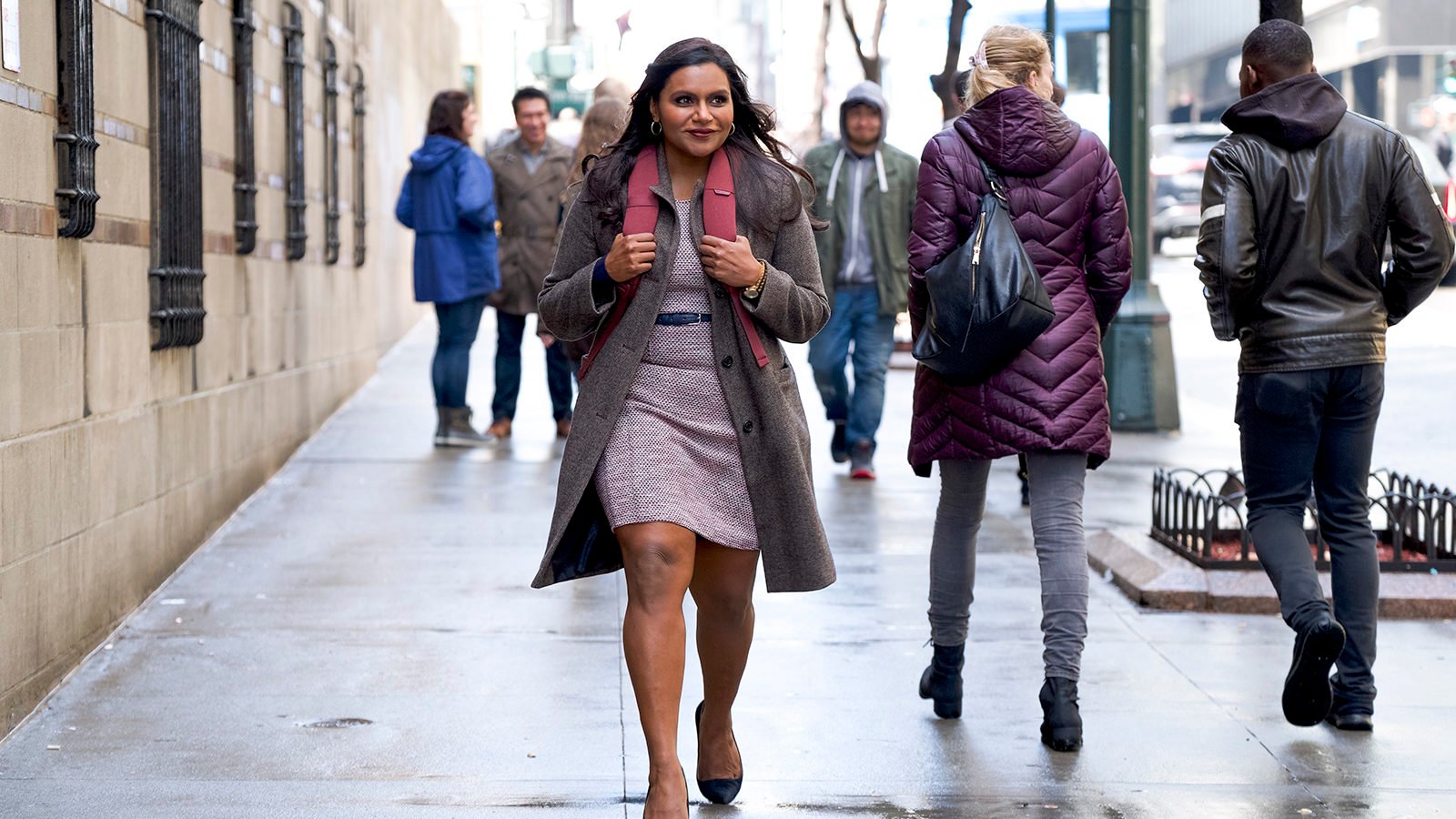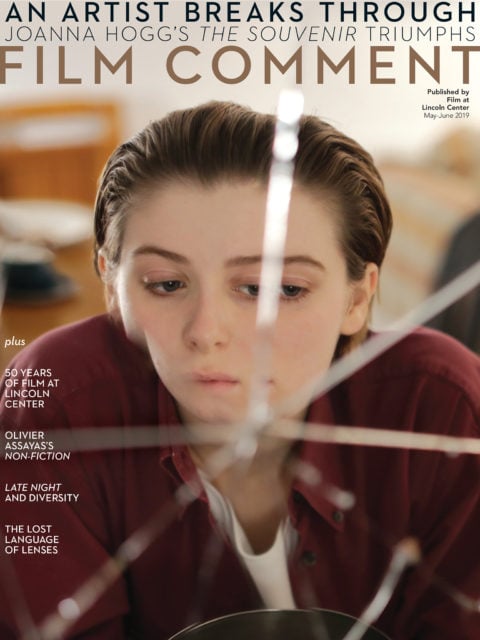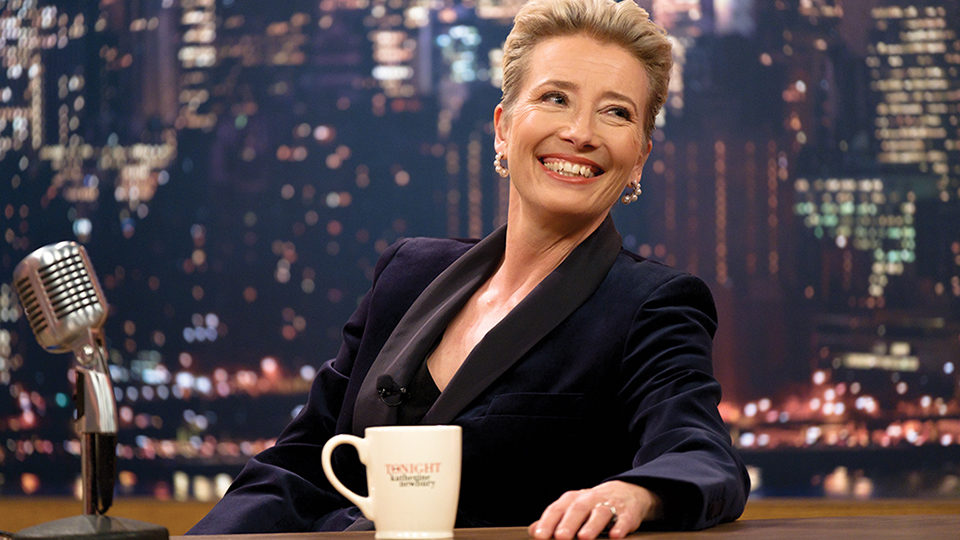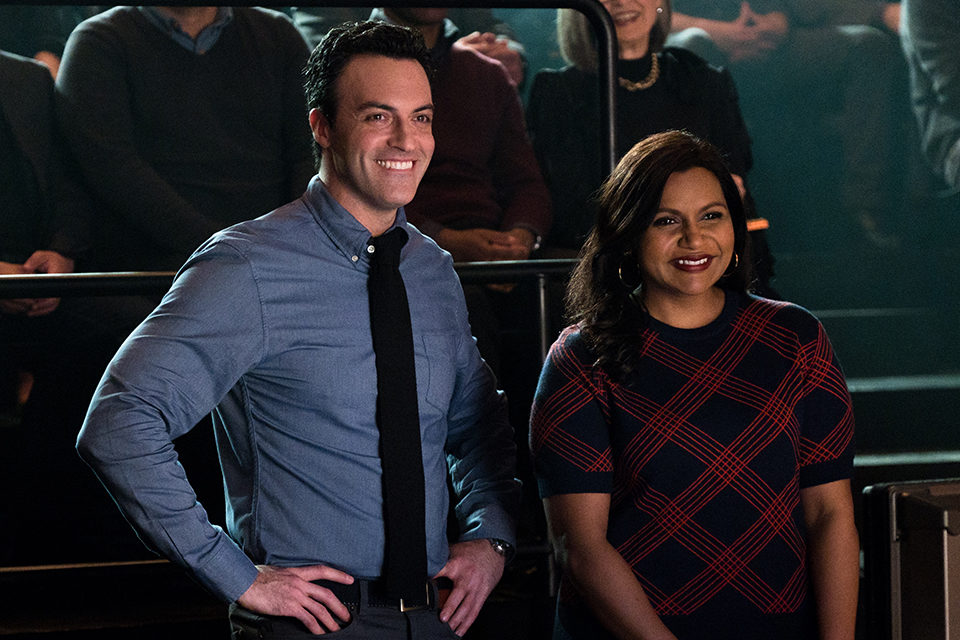
Write What You Know
Late Night invites us into a wondrous alternate reality—a world in which a woman is the host of a premier late-night talk show, and has been for so long that she’s now jaded and considered out of touch. When we first meet Emma Thompson’s witheringly sardonic and immaculately dressed Katherine Newbury, she’s accepting yet another Emmy for her 28-year stint as the face of a show called Tonight. But the awards don’t amount to much, we soon discover; her ratings have been in decline for a couple of years, in part because her writers’ room comprises entirely milquetoast men whom she has never even taken an interest in meeting. When an argument with one of these (uniformly white) men culminates in Katherine being accused of hating women, she issues her ever-patient producer Brad (Denis O’Hare) a simple dictum: Hire. A. Woman.

The speculative thrill of a woman reigning for decades over the daily, uniquely American ritual of late-night television primes us for the even more fantastical movie-logic that introduces Mindy Kaling’s Molly Patel to Late Night. Molly is an efficiency technician at a chemical plant and has no experience in comedy beyond cracking puns over the PA system at her factory. When she shows up to interview for the writing job, Brad is puzzled as to how she ended up there. Molly’s explanation is ridiculously, hilariously contrived, involving an essay contest and a skillfully wrangled meeting with an executive at the company that owns both her chemical plant and the network that airs Katherine’s show. Brad is about to dismiss her when he receives an impatient phone call from Katherine: “Have you hired a woman yet?” He sighs, and Molly gets the job.
It’s all a bit ludicrous, but that seems to be the very point. Late Night is a warm, winsome Hollywood comedy that proceeds along familiar lines and culminates with easily won happy endings: in the course of its 102 minutes, the ice-cold Katherine is softened and improved by the earnest oddball Molly, who proves herself, despite the digs and doubts of her colleagues, to be an indispensable talent. But watching the film this year at Sundance, which I attended with the help of the festival’s new Press Inclusion Initiative for underrepresented critics, and where, at parties, I fielded pointed questions about how I had acquired my priority badge, I sensed something sharper in the film’s opening gags—something closer to satire than to wish-fulfilling fantasy. Molly is the embodiment of the trope of the diversity hire; of the idea that, as one of Katherine’s writers resentfully says in the film, you can get “any job you want with zero qualifications” if you’re a woman of color. In literalizing that idea, Late Night exposes it as an absurd, Tootsie-esque fiction, the sort of thing only possible in schmaltzy showbiz movies, not in real life.
The stereotype of the diversity hire is something with which Kaling—the writer, co-producer, and star of Late Night—is intimately familiar. When I spoke with her in early April about the movie, she told me that she had landed her first TV staff-writing gig—on NBC’s hit show The Office—through a diversity program. “For years, I thought I was supposed to be embarrassed about that,” she said, “even though no one else is embarrassed about being a legacy or having all those other kinds of access.” Late Night is inspired, in part, by her coming to terms with that feeling of embarrassment, which gives the film a singular and timely sense of perspective. As Molly struggles to find her seat at the table in Katherine’s writers’ room (literally: she has to make do with an inverted trash can), she grapples with that peculiar predicament that women and minorities increasingly find themselves in these days—of being placed as tokens in workplaces that aren’t yet equipped to support them.

Late Night (Nisha Ganatra, 2019)
Late Night features a host of solid talents: it is directed by TV veteran Nisha Ganatra (whose résumé includes Kaling’s The Mindy Project); fueled by the radiant, charismatic presence of Thompson; and outfitted with gifted comic performers like O’Hare, John Early, and Ike Barinholtz. But this is a “Mindy project” through and through, not least because of its writerly, joke-a- minute humor. Late Night continues the tradition of the workplace comedies that have made Kaling a household name, from The Office, which she both wrote and acted in, to The Mindy Project, her smart, kooky, self-starring sitcom set in an OB-GYN clinic. “Since Americans work such long hours, our personal lives also play out in the workplace,” Kaling said when I asked her about her affinity for these stories. “If you do well at work, it’s a direct measure of you as a person. It’s ultimately the most relatable setting.”
Like these shows, Late Night derives much of its humor (and heart) from its characters’ attempts to navigate the blurring boundaries between their personal and professional lives. But the premise of a late-night talk show allows Kaling to explore these concerns on a much larger scale, with sociocultural, rather than just interpersonal, stakes. Part of it is the very setup of a late-night talk show: designed as a cross between a living room, an office, and a sitcom stage, and fronted by a jokey, avuncular newscaster, it’s the perfect example of a work space where the categories of public and private collide in uneasy ways. But Kaling also embeds her film within a fast-corporatizing TV and entertainment landscape, where these boundaries are being altered ever more radically. (And where cultural production looks a lot more like commodity production—hence Molly’s pivot from chemical plant to comedy, which slyly calls back to David Letterman’s recurring jabs in the 1980s at NBC’s merger with General Electric.)
Thompson’s Katherine finds herself up against all of these cultural shifts. Her wry, intellectual comedy, delivered with a touch of posh British superiority, harkens back to the days when it was perhaps more important to exude authority on TV than authenticity. Now, she’s being edged out by the more relatable and shareable (and interchangeable) Jimmys of the late-night world, and the smug new network president, played by Amy Ryan, threatens to replace her with a viral young comedian (Barinholtz) specializing in crass, sexist, and racially insensitive jokes. Desperate to save her show, Katherine finally deigns to meet her writers and tasks them with coming up with fresher, more relevant material. Molly rises to the challenge with a joke about reproductive health and menopause; “Make jokes only you can make,” she urges her boss. Katherine warily agrees, but reneges when Brad warns her quietly before the show, “Be careful about showing them who you are. Once you turn that switch on, you can never turn it off.”
These questions of identity and authenticity are central to Late Night, and the generational (and temperamental) differences in how Katherine and Molly contend with them make for a thoughtful exploration of two women in different, exceptional positions in the media. This isn’t a new formula, by any means. Late Night owes a significant debt to The Devil Wears Prada (2006), which centers on the relationship between a demanding fashion-magazine editor—Meryl Streep’s indelible Miranda Priestly—and her new, fish-out-of-water personal assistant; it also shares some DNA with the more recent (and much less funny) Trainwreck (2015), starring Amy Schumer as a young journalist dealing with a mean boss and commitment issues. But what makes Late Night different from these films is, to put it rather simplistically, its intersectionality. Kaling’s script is closely attuned to the ways in which the crisscrossing axes of age, race, and gender inform the quirks and workplace experiences of its characters. Katherine’s reluctance to mine her femininity for jokes (“Never start a sentence with ‘as a female’—it’s tacky,” she says early in the film) isn’t reduced simply to her rigidity or hauteur. It comes, the film suggests, from having been the Only Woman in her field for long enough to be wary of the ways in which the media cannibalizes and pigeonholes narratives of identity. Katherine believes that comedy is a meritocracy, and she clings to that myth like it’s protective armor. “You think I’ve never been accused of sleeping my way to the top?” she says to Molly. “If you want people to see you as something other than a diversity hire, you have to make them.” This illusion of merit was something Kaling herself said she grew out of as she acquired more success and became an employer in the industry. “When you’re young and you’re one of the few people of color you see in these kinds of jobs, you think, oh, it is a meritocracy; I just happen to be best,” she said. “And that’s completely incorrect; it just means you’re lucky and you were in the right place at the right time. This movie is really about me coming to terms with the kinds of access you need to see these jobs in Hollywood.”
For Molly, who she is—a woman of color, with a background in industrial efficiency—is all she’s got going in this world that she’s slipped into on a fluke. One of the most revealing scenes in the film takes place at a party that Katherine is pressured into throwing to appear more approachable to the public. When journalists start piling on her for the lack of diversity on her staff, Molly jumps in to save the day, proclaiming herself Katherine’s protégé and posing cheerfully for photo ops with her grudging but grateful boss. Kaling imbues the character with a sense of grit and resourcefulness that never comes off as plain opportunism; Molly is humble enough to know where she stands and bright enough to be able to put it to use.
That thin line between making use of what makes you different and becoming typecast is something Kaling has navigated deftly in her own career. In 2002, a few years before The Office, Kaling found critical success with Matt & Ben, an off-Broadway play based on the kind of cleverly absurd, pop culture–savvy idea that has since become her trademark: what if the script for Good Will Hunting had fallen magically into Ben Affleck’s lap while he and Matt Damon were young, struggling actors? Kaling and her co-writer Brenda Withers played the parts of Affleck and Damon, and in the clips available on YouTube, one can see Kaling—dressed in sweats and a reversed baseball hat—effortlessly milk the comedy of a short, Indian-American woman channeling Affleck’s bro-y Boston swagger. Her characters in The Office (2005-13) and The Mindy Project (2012-17) followed the same broad template, but with an added layer of self-deprecating authenticity. They exaggerated aspects of Kaling’s own personality—her love of romantic comedies, obsession with celebrity and fashion, and self-professed tendency to be dramatic—to create ditzy rom-com heroines who were silly, endearing, and wholly idiosyncratic. “When there is little representation and you’re starving to see an Indian on TV, there’s a feeling that characters shouldn’t be idiosyncratic, they shouldn’t make mistakes, because you owe it to the Indians watching,” Kaling said. “But I come from comedy, and being good and perfect isn’t really funny.”

Late Night (Nisha Ganatra, 2019)
Kaling’s characters felt especially refreshing in how they subverted that burden of representation that’s often placed on minorities on screen. The Mindy Project was the first American television show to be created by or star a South Asian woman. Although its humor made use of Kaling’s racial identity, often playing against our expectations of Indians in TV and film, it wasn’t about race and immigration in the vein of Aziz Ansari’s original series Master of None (2015-) or Hasan Minhaj’s popular stand-up special Homecoming King (2017). That very quality also earned The Mindy Project its most vehement critics, however, who called it out for failing to meaningfully address her ethnicity and featuring mostly white love interests. But Kaling acknowledged these criticisms thoughtfully in the fourth season of the show with the same approach that had made her auto-fictional Dr. Mindy Lahiri so appealing in the first place: she leaned into her contradictions, opening herself up for critique without compromising the idiosyncrasies of her character. In one episode, she finally goes out with an Indian man, who calls her a “coconut”: brown on the outside and white on the inside. This precipitates an introspective storyline in which Kaling’s character considers her life and upbringing in suburban Boston (where Kaling herself grew up) and her parents’ attitudes toward assimilation. It also yields one of the greatest lines in the show: when Mindy asks a co-worker if he thinks of her as an Indian woman, he says, “Honestly, I think of you as a white man—largely because of your entitlement.”
The Mindy Project perfectly embodies Molly’s “make jokes only you can make” credo: it inflects the broader, inescapable narratives of identity that circumscribe Kaling’s humor with a measure of personal truth, so that they never flatten into the clichés that Katherine so fears. And this philosophy, Kaling suggests, can help an older white comedienne as much as a diversity hire. Katherine’s turning point comes when (in another of Late Night’s cheesy, only-in-a-movie moments) she follows Molly to a cancer benefit and surprises the crowd with some impromptu stand-up. When she realizes that her jokes about being “too old to play The Mummy” land better than the ones about the tautological semantics of Twitter faving, she finally gives in to Molly’s ideas. Molly soon has her trending online with a sketch series that finds Katherine playing a parody of a “white savior,” helping black men hail cabs and Asian women shop at fancy stores. It’s not laugh-out-loud funny (and here, the film’s late-night setting provides a useful excuse, setting a realistically low bar for provocative humor), but it feels rather affirming in a day and age when comics routinely complain that PC culture has led to the death of comedy.
In fact, one of the pleasures of Late Night is how, even in its slower bits, it feels like a salve for the crises in mainstream comedy: a how-to for comedians stymied by the cultural and industrial changes of late. A couple of years ago (Film Comment March-April 2017), critic Violet Lucca bemoaned the state of the post-2010 American comedy film, arguing that Hollywood’s reboot frenzy, the intensified focus on global markets, and the rise of the Internet and TV as the preferred platforms for comedians had drained the genre of its most essential qualities: “If Hollywood tried the more difficult option—getting screenwriters who privilege sharp wordplay over referential meta-commentary and filmmakers who can stage physical comedy that’s more complex than an actress splashing spaghetti on her face while driving a minivan—we would have something built to last in an otherwise dispensable, instantly forgettable media environment.” Kaling straddles both extremes in the bighearted Late Night, combining easy laughs and movie clichés with a distinctively political sense of lived experience.
Molly does indeed get hit in the face by a trash bag in her first scene, but the funniest gag in the film comes when she introduces herself as Molly to Brad—and he immediately relays her name as “muh-LEE” to the other writers. Drawing on a precise sociological observation, the joke captures in two (masterfully delivered) syllables the liberal tendency to overcompensate for cultural ignorance to the point of reinforcing it. Like the best satire, it exposes the absurdity in ordinary gestures, but also reminds us that what’s ordinary is not universal. Instead, it subtly cues us into a specific and novel point of view—one that’s markedly different from the Hollywood default of white and male.
And Kaling’s one-step means of achieving this kind of comedy? Hire. More. Women. And people of color. “The number one way that I have seen my shows become better is by having a diverse writing staff,” she said to me. “It’s such a simple thing that people sort of think is true but I’ve never seen in a movie before.” That’s the vision the show ends on: Katherine’s writers’ room transformed, bustling with men and women of various ages and races. But the show posits this solution not just as a way to expand the range of jokes one can tell; there’s a deeper emotional (and perhaps autobiographical) rationale that Kaling relays through Katherine. In the last half hour of the film, the character contends with a scandal as a past affair becomes public, jeopardizing her marriage with her older husband (John Lithgow, gentle as ever). She initially scoffs at Molly’s suggestion that she make an official statement—the millennial obsession with catharsis is “narcissistic,” she declares—but she comes around eventually with a moving, soul-baring speech on her show. Thompson brings a real, aching sadness to the moment (and a bit of herself, too—an earlier scene features one of her stand-up bits about depression from the ’90s). As Katherine feels her identity and her difference anew, she confronts the emotional damage her constant, unforgiving demand for excellence has wreaked on her. It’s not easy, she comes to realize, to be the first or the only one of anything.
Devika Girish is a freelance film critic. She grew up in India and currently lives in Los Angeles.







